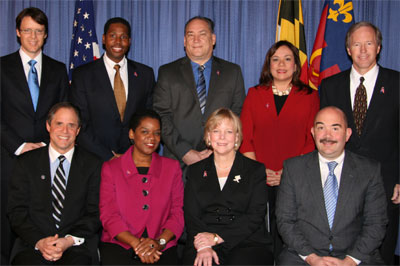
June 11 Public Hearing: Zoning Ordinance Changes
 The Montgomery County Council will hold a public hearing at 7:30 p.m. on June 11 on the first major rewrite of the County Zoning Code since 1978. Among the goals of the most significant changes in 35 years will be to update all aspects of the ordinance, create more predictability in the standards and promote “green” land use practices.
The Montgomery County Council will hold a public hearing at 7:30 p.m. on June 11 on the first major rewrite of the County Zoning Code since 1978. Among the goals of the most significant changes in 35 years will be to update all aspects of the ordinance, create more predictability in the standards and promote “green” land use practices.
The public hearing will be held in the Third Floor Hearing Room of the Council Office Building, which is located at 100 Maryland Ave. in Rockville. The meeting will be televised live by County Cable Montgomery (CCM—Cable Channel 6 on Comcast and RCN, Channel 30 on Verizon) and can be viewed via streaming through the County web site at www.montgomerycountymd.gov.
Those wishing to speak should call 240.777.7803.
On May 3, the Council received a proposed comprehensive rewrite of the code from the County’s Planning Board. Most of the changes apply to non-residential (commercial, mixed-use and employment-related) zones. The public hearing will give residents the opportunity to discuss the desirability or undesirability of proposed allowable land uses in residential zones.
The full text of the proposed code and proposed zoning on property to implement the new code is available online at www.zoningmontgomery.org .
The Council authorized the ordinance changes in 2008 when it approved the Planning Board’s work program with the following goals for the rewrite:
- Update the ordinance—all aspects of the document, from the number of districts to the number of processes outlined in various sections.
- Simplify all aspects of the document.
- Improve the organization of the document.
- Rationalize/update provisions to reflect the changing development climate with a greater emphasis on infill development.
- Create predictability in the standards as well as the format.
- Promote “green” land use policies.
The proposed draft completely restructures the current code. The current code is organized by major zoning classifications. There is a different land use table in every major section of the code. The revisions in the proposed draft define chapters by the form of regulation or function (e.g., land use, optional development, standard development, amendments). For example, the draft has a single “Uses and Use Standards” chapter, with a single land use table for all zones.
The draft ordinance has fewer zones than the current ordinance and places particular land use categories (e.g., newspaper stand, flower shop) into more general land use categories (e.g., retail/service). In the Commercial/Residential (C/R) and Employment zones, reducing the number of uses makes the zones generally more permissive than the current code. However, the proposed code would more directly regulate the design aspects of development in these zones.
The following are examples of other significant substantive changes:
- Mixed-use and employment zones are consolidated, with the exception of the C/R, Life Science Center (LSC), Commercial/Residential/Town (CRT) and Commercial/Residential/Neighborhood (CRN) zones.
- All floating zones—a zone that can be applied for by a single property owner—are new and clearly identified as floating zones.
- The standards for the number of on-site parking in commercial zones are reduced in some instances and design standards are added. The parking reductions reflect the current needs for less parking and the emphasis of the use of public transit in transit accessible areas.
- The amount of open space required in mixed-use and employment zones is generally reduced. The intent of reduced open space is to create walkable environments where activity sites are grouped closer together.
- The process for reviewing and approving Local Map Amendments is simplified.
The one-family residential zones are retained with the same development standards. The names of the zones remain the same, except for:
- The R-150 (residential lots with 15,000 square feet) and RMH-200 (residential mobile homes) would be consolidated in the R-200 zone.
- RMH zone property would be consolidated into the R-60 zone.

Engage us on Facebook
Follow us on Twitter
Tweets by @mymcmedia